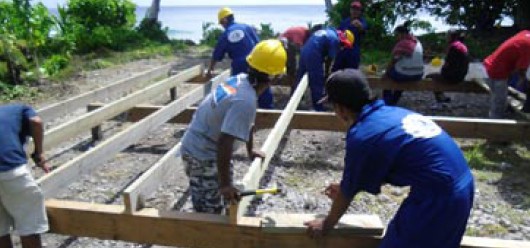
For Immediate Release
USAID sponsored a week-long carpentry workshop at the College of Marshall Islands’ (CMI) Arrak campus in Majuro, Republic of Marshall Islands (RMI) from March 4 to 8.
The workshop aimed to demonstrate techniques and materials that may be used to produce a durable, typhoon-resistant house that would provide protection from the effects of climate change.
The Reconstruction Assistance Coordinator for USAID’s Disaster Management program in RMI and Federated States of Micronesia (FSM), Christian Oakes, traveled to Majuro to work with the students and faculty to integrate the carpentry workshop in CMI’s existing construction training program by building a small demonstration wood house.
Graduates of CMI’s one-year certificate program learn aspects of construction including safety, use of tools, construction fundamentals, masonry/concrete work, framing and finishing, and plan reading. The curriculum includes classroom study and lectures, as well as practical hands-on execution of small projects. CMI’s construction training program began in 2010 and has grown rapidly. There are currently 31 students enrolled in the program, 11 of whom are women.
The USAID-sponsored workshop allowed the students to apply their classroom learning to building an actual house from the ground up.
The workshop emphasized three main aspects of building with wood to combat the harsh environment of the islands. The use of pressure-treated lumber serves to resist termites and other wood-destroying organisms. Stainless steel and aluminum fasteners prevent corrosion and eventual failure from the ocean’s salt-water spray. Metal straps and brackets provide continuous connections from the foundation to the wall and from the wall to the roof, allowing the building to resist strong winds from typhoons.
Oakes said, “I wanted to find a practical activity that could demonstrate the viability of wood construction for houses, and help advance the college’s construction program. By demonstrating typhoon-resistant wood construction, this exercise supported USAID’s disaster recovery planning as it helps to validate wood construction as an option in the recovery phase following a large disaster.” Oakes also conducted a similar workshop in Pohnpei, FSM. USAID provides assistance in disaster planning, response and reconstruction in RMI and FSM. The workshop contributes to the countries’ overall disaster preparedness and builds construction skills of the youth.







Comment
Make a general inquiry or suggest an improvement.